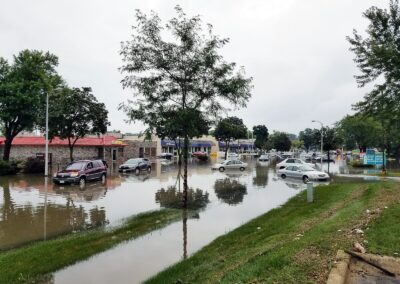Ensuring Business Continuity through Data Replication
Data Replication for Disaster Recovery: A Critical Strategy
In the contemporary business environment, safeguarding data is paramount. Data Replication for Disaster Recovery is a crucial strategy that ensures business continuity by continuously copying data to a secondary location. This approach guarantees that up-to-date information is available for recovery in case of a primary site failure, a necessity for organizations in Saudi Arabia, UAE, Riyadh, and Dubai where uninterrupted operations are vital.
Data replication involves creating exact copies of data in real-time or at scheduled intervals, which are stored in a different physical or cloud location. This redundancy means that if the primary data center experiences a disruption—be it due to natural disasters, hardware failures, or cyberattacks—the secondary site can immediately take over, minimizing downtime and data loss. For instance, a financial institution in Dubai can utilize data replication to ensure that transaction records are continuously updated and available, even if the primary system fails.
Moreover, data replication supports various replication methods, including synchronous and asynchronous replication. Synchronous replication writes data to both the primary and secondary locations simultaneously, ensuring zero data loss but requiring high bandwidth. Asynchronous replication, on the other hand, writes data to the secondary site with a slight delay, making it more bandwidth-efficient but potentially losing a small amount of data during a failure. This flexibility allows businesses to choose the replication method that best suits their operational needs and infrastructure capabilities.
Enhancing Disaster Recovery Plans with Data Replication
Integrating data replication into disaster recovery plans enhances the resilience and responsiveness of an organization’s IT infrastructure. For businesses in Saudi Arabia and the UAE, where rapid technological advancements and economic growth demand robust IT systems, data replication provides a reliable solution to protect critical data assets. By ensuring that data is continuously updated and accessible, organizations can recover quickly from disruptions and maintain operational continuity.
A key benefit of data replication is its ability to support real-time recovery operations. During a disaster, the secondary site can be activated immediately, allowing businesses to resume operations with minimal delay. This capability is particularly critical for sectors like healthcare and finance, where data integrity and availability are paramount. For example, a hospital in Riyadh can ensure that patient records are always up-to-date and accessible, enabling uninterrupted patient care even during system outages.
Additionally, data replication simplifies compliance with regulatory requirements. Many industries have stringent regulations regarding data protection and availability. Implementing data replication helps businesses in Dubai and other regions meet these requirements by ensuring that data is consistently backed up and can be recovered swiftly. This not only protects the business from legal repercussions but also builds trust with clients and stakeholders by demonstrating a commitment to data security and reliability.
Leveraging Modern Technologies in Data Replication
Modern technologies significantly enhance the effectiveness of data replication strategies. Artificial Intelligence (AI) and Machine Learning (ML) can be integrated to optimize replication processes, predict potential failures, and automate recovery operations. For instance, AI-driven tools can analyze system performance data to identify patterns that precede hardware failures, allowing IT teams to address issues proactively before they escalate into disasters.
Furthermore, cloud-based replication offers scalable and cost-effective solutions for businesses. By leveraging cloud infrastructure, companies can replicate their data to multiple geographic locations, ensuring redundancy and reducing the risk of data loss. This approach is particularly beneficial for businesses in the UAE and Saudi Arabia that are looking to expand their digital footprint while maintaining robust disaster recovery capabilities. Cloud providers often offer integrated replication services that simplify the process of setting up and managing secondary data sites.
Blockchain technology also plays a role in enhancing data replication. By providing a secure and immutable ledger, blockchain ensures that replicated data remains tamper-proof and verifiable. This is especially valuable for industries such as finance and supply chain management, where data integrity is crucial. For example, a logistics company in Dubai can use blockchain to ensure that all replicated data regarding shipment records and transactions is accurate and trustworthy.
Conclusion: The Future of Data Replication in Disaster Recovery
In conclusion, Data Replication for Disaster Recovery is an indispensable strategy for modern businesses aiming to ensure data integrity and operational continuity. By continuously copying data to secondary locations, organizations can protect themselves against data loss and quickly recover from disruptions. For enterprises in Saudi Arabia, UAE, Riyadh, and Dubai, investing in robust data replication solutions is essential for maintaining competitive advantage and operational resilience.
The integration of advanced technologies such as AI, ML, and blockchain further enhances the capabilities of data replication, making it more efficient and reliable. These technologies enable proactive monitoring, predictive maintenance, and secure data management, ensuring that businesses can respond swiftly to any disruptions and minimize downtime. As the digital landscape continues to evolve, the importance of comprehensive data replication strategies will only grow, underscoring the need for businesses to stay ahead of the curve.
Looking ahead, the future of data replication in disaster recovery will be shaped by continuous technological advancements and the increasing importance of data-driven decision-making. Businesses that prioritize robust and adaptive data replication strategies will be better positioned to navigate the uncertainties of the digital age, ensuring that their operations remain resilient, their data secure, and their clients’ trust unshaken. Embracing a proactive approach to data replication is not just a best practice—it is a strategic imperative for achieving long-term success in an increasingly interconnected world.
#DataReplication, #DisasterRecovery, #BusinessContinuity, #SecondaryLocation, #DataBackup, #ITInfrastructure, #ModernTechnology, #BusinessSuccess, #Leadership, #ProjectManagement, #UAE, #SaudiArabia, #Dubai, #Riyadh, #ArtificialIntelligence, #Blockchain























